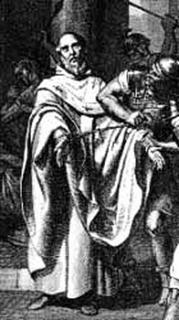Saint Cyprian of Carthage (also called Thaschus Caecilius Cyprianus) is a Latin Father of the Church.
Cyprian's writings are of great importance and following Tertullian, he was the second great Christian Latin writer. Of his numerous writings, Saint Jerome said “it is unnecessary to make a catalog of the works of his genius, since they are more conspicuous than the sun”.
The persecution of the Church by the Roman Emperor Decius began around 250, and Saint Cyprian lived in hiding. He secretly ministered to his flock and his enemies condemned him for being a coward and not standing up for his faith. Because the persecutions of Decius had been so severe many Christians fell away from the faith. The question of the reconciliation of lapsed Christians with the Church had given rise to the custom of admitting them to Communion if a martyr requested this favor for them. Cyprian at first opposed the practice, but the sincerity of their contrition caused him to relent.
This gave rise to the schism of the deacon Felicissimus who opposed readmitting any who had apostatized. Upon returning to Carthage in 251 Cyprian excommunicated the leaders who opposed reconciliation for those returning to the Church. He supported Pope Cornelius against the anti-pope Novatian.
In the persecutions of the Roman Emperor Valerian, he was exiled to Curubis in 257, then brought back to Carthage and was martyred by beheading in 258. His name occurs in the Communicantes in the Canon of the Mass.
* * * * * * *
The following is from Saint Jerome's "Lives of Illustrious Men" in regard to Saint Cyprian:
"Cyprian the Bishop - Cyprian of Africa, at first was famous as a teacher of rhetoric, and afterwards on, the persuasion of the presbyter Caecilius, from whom he received his surname, he became a Christian, and gave all his substance to the poor. Not long after he was inducted into the presbytery, and was also made bishop of Carthage. It is unnecessary to make a catalogue of the works of his genius, since they are more conspicuous than the sun.
He was put to death under the Emperors Valerian and Gallienus, in the eighth persecution, on the same day that Cornelius was put to death at Rome, but not in the same year."
* * * * * * *
The following are a few quotations from some writings, a letter, and a sermon by Saint Cyprian of Carthage:
You cannot have God for your Father if you do not have the Church for your mother.... God is one and Christ is one, and his Church is one; one is the faith, and one is the people cemented together by harmony into the strong unity of a body.... If we are the heirs of Christ, let us abide in the peace of Christ; if we are the sons of God, let us be lovers of peace.
Saint Cyprian, from The Unity of the Catholic Church
* * * * * * *
Whatever a man prefers to God, that he makes a god to himself.
Saint Cyprian
* * * * * * *
Let us remember one another in concord and unanimity. Let us on both sides of death always pray for one another. Let us relieve burdens and afflictions by mutual love, that if one of us, by the swiftness of divine condescension, shall go hence the first, our love may continue in the presence of the Lord, and our prayers for our brethren and sisters not cease in the presence of the Father's mercy.
Saint Cyprian from Letters, 253
* * * * * * *
You who are envious, let me tell you that however often you may seek for the opportunity of injuring him whom you hate, you will never be able to do him so much harm as you do harm to yourselves.
He whom you would punish through the malice of your envy, may probably escape, but you will never be able to fly from yourselves. Wherever you may be your adversary is with you, your sin rankles within. It must be a self-willed evil to persecute a person whom God has taken under the protection of His grace; it becomes an irremedial sin to hate a man whom God wishes to make happy.
Envy is as prolific as it is hurtful; it is the root of all evil, the source of endless disorder and misery, the cause of most sins that are committed. Envy gives birth to hatred and animosity. From it avarice is begotten, for it sees with an evil eye honors and emoluments heaped upon a stranger, and thinks that such honors should have been, by right, bestowed upon himself. From envy comes contempt of God, and of the salutary precepts of our Savior.
The envious man is cruel, proud, unfaithful, impatient, and quarrelsome; and, what is strange, when this vice gains the mastery, he is no longer master of himself, and he is unable to correct his many faults. If the bond of peace is broken, if the rights of fraternal charity are violated, if truth is altered or disguised, it is often envy that hurries him on to crime.
What happiness can such a man enjoy in this world? To be envious or jealous of another, because such a one is virtuous and happy, is to hate in him the graces and blessings God has showered down upon him.
Does he not punish himself when he sees the success and welfare of others? Does he not draw down upon himself tortures from which there is no respite? Are not his thoughts, his mind, constantly on the rack?
He pitilessly punishes himself, and, in his heart, performs the same cruel office which Divine Justice reserves for the chastisement of the greatest criminal.
Saint Cyprian
* * * * * * *
Lastly, the following is from the "Acts of the Martyrdom of Saint Cyprian" by Saint Pontius:
On the morning of the 14th of September, a great crowd gathered at the Villa Sexti, in accordance with the order of the governor Galerius Maximus. That same day the governor commanded Bishop Cyprian to be brought before him for trial. After Cyprian was brought in, the governor asked him, "Are you Thascius Cyprian?"
The bishop replied, "Yes, I am."
The governor Galerius Maximus said, "You have set yourself up as an enemy of the gods of Rome and our religious practices. You have been discovered as the author and leader of these heinous crimes, and will consequently be held forth as an example for all those who have followed you in your crime. By your blood the law shall be confirmed." Next he read the sentence from a tablet. "It is decided that Cyprian should die by the sword."
Cyprian responded, "Thanks be to God!"
After the sentence was passed, a crowd of his fellow Christians said, "We should also be killed with him!" There arose an uproar among the Christians, and a great mob followed after him. Cyrprian was then brought out to the grounds of the Villa Sexti, where, taking off his outer cloak and kneeling on the ground, he fell before the Lord in prayer. He removed his dalmatic and gave it to the deacons, and then stood erect while waiting for the executioner. When the executioner arrived, Cyprian told his friends to give the man 25 gold pieces.
The most blessed martyr Cyprian suffered on the 14th of September under the emperors Valerian and Gallienus, in the reign of our true Lord Jesus Christ, to whom belong honor and glory for ever. Amen.





